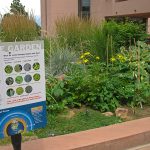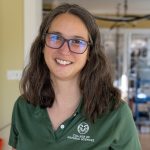
The Spur campus in Denver, CO has awarded a grant to Megan Willis, Assistant Professor in Chemistry, Delphine Farmer, Professor in Chemistry, and Shantanu Jathar, Associate Professor in Mechanical Engineering to establish a Regional Air Monitoring Site (RAMS). The site will bring an atmospheric perspective to Spur’s focus on human, animal, and environmental health.
Spur campus is made up of three buildings and each one has its own focus. The building named Vida (Spanish for life) opened in January 2022 and focuses on human and animal health. The Terra building (Latin for earth) opened in June 2022 and focuses on food and agriculture. Opening in January 2023 is the Hydro building (Greek for water), and its focus will be on water. Spur is a community-oriented space that welcomes the public, including K-12 students on field trips. It fosters research collaborations, create spaces for innovation and collaboration, and offers a variety of services open to the community. Adding the RAMS site to Spur will contribute to a focus on environmental health, which fits in nicely with what the Spur campus is all about. “The Spur grant is exciting because it will help us bring a complementary atmospheric perspective to Spur’s focus on human, animal and environmental health.” Dr. Willis explains, “Poor air quality is a leading environmental health risk, and the RAMS will provide a platform for community outreach and education that we just wouldn’t have without Spur.”
The RAMS will serve as a field site in the Front Range with dedicated and continuous measurements of key components of urban air quality. The site will also serve as a benchmark for future low-cost sensor networks that focus on neighborhood-scale air quality and will provide the opportunity for incorporating hands-on data collection and analysis in undergraduate courses such as Chem 338 Environmental Chemistry. “The Spur project is an exciting opportunity for both undergraduate and graduate students in Chemistry to learn about hands-on field measurements.” Dr. Farmer explains, “We will be incorporating real-time measurements and data into classes so students will get to actively participate in analytical and atmospheric chemistry research and help us understand air quality in the Front Range.”
The grant will be used to purchase equipment for data collection and that data will be remotely transferred to the main campus for students to study. The grant will also cover the cost to build an Ozone Garden (e.g., see: https://www.cgd.ucar.edu/research/ozone-garden/) at Spur that will facilitate outreach and education around the detrimental impacts of poor air quality on ecosystem health. “In addition to tracking air quality trends at a high-altitude site in the Western US, the RAMS site could also serve as a field site for testing low-cost environmental sensors and a hub for environmental justice research and advocacy” says Dr. Jather.
Drs. Willis, Farmer, and Jathar hope to have the RAMS and Ozone Garden up and running by summer 2023. “CSU has one of the strongest atmospheric chemistry programs in the country, with active research on sensor networks, urban air quality, climate impacts, wildfire smoke, and health effects; however, we have no regular field site in the Front Range.” Dr. Willis explains. The RAMS and Ozone Garden will serve as the field site CSU needs to collect this important data.
CSU Spur has a mission of bringing learning to life for everyone, through this grant and the addition of RAMS and the ozone garden, these CSU researchers are shining a light on the importance of environment health and air quality in our local community.



